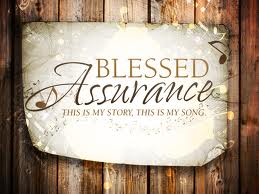 I occasionally post theology and Bible questions that get sent in by readers. Here is a question that was recently sent in about depression and certainty in the assurance of salvation.
I occasionally post theology and Bible questions that get sent in by readers. Here is a question that was recently sent in about depression and certainty in the assurance of salvation.
If you have any other general advice dealing with doubt in general about Jesus I would really appreciate it.
I used to worry if my works were good enough and if I had “saving faith”. Now I worry about whether I have “saving assurance”. Every time I have a feeling of certainty regarding Jesus and his promise of eternal life it’s immediately followed by a feeling of doubt. Then I start to wonder if I only have 99% assurance or maybe I’m not fully persuaded etc. Compound all that with at times general doubts about Jesus and God and I’m on a really vicious rollercoaster.
I’m constantly depressed and worried about going to hell. I’m utterly miserable.
Please pray for me. I don’t want to go to hell and I want to be able to tell my children with confidence how they can go to heaven when they die so that we’ll all be together forever.
Thanks.
This is a tough question, one which I have been struggling with as well for several years. And so far, I am not sure I have the best answer, but I will share my current thinking on these subjects.
I wrote a post a while back called “Jesus Uses Doubters Too.” That post, however, dealt with a slightly different question, which was whether or not Jesus can work with people who doubt Him and His claims. In other words, the text I am referring to in that post concerns people who apparently have already believed in Jesus for eternal life, but have some doubts about the rest of His claims.
Your question seems to be directed more toward the initial act of believing in Jesus for eternal life, right? You have heard some say that faith is 100% certainty, and you are afraid that maybe you are only 99% certain.
Small Faith and Great Faith
I don’t know if you will find my explanation helpful or not, but I try not to think about faith as a percentage or a degree. I do not think there are degrees of faith, or percentages of certainty. I think of faith more like a light switch (but not a dimmer switch!)—it is either on or it is off. And just as lights can be switched on and off depending on the time of day, and the circumstances of the person in the room, so also, faith can waver back and forth from day to day, even from minute to minute, depending on the evidence that is presented to a person, their past history, the circumstances in which they find themselves, and a variety of others factors.
When the Bible talks about great faith or small faith, it is not talking about degrees of faith, but whether or not a person believes difficult truths. Some things are easier to believe than others because we have more evidence for some things compared to others. It is easy for me to believe, for example, that the chair I am sitting in will hold me up, because right now, I am sitting in it.
When it comes to spiritual matters, however, it is not easy to believe. What we are called to believe is relatively simple, but it is not easy. What complicates the matter further is that each spiritual belief is built upon a whole framework of other spiritual beliefs, so that if one of them begins to collapse, the whole house of cards comes tumbling down.
 For example, we say that to receive eternal life, you must simply believe in Jesus for it. Well, this is a relatively simple belief, but it is not easy to believe. After all, to believe this fact, we must also believe that there is a God, that He loves us, that He has revealed Himself to us in Scripture and through Jesus, that the Bible is correct in what it says about all these things, that Jesus truly is able to offer us eternal life, and on and on it goes.
For example, we say that to receive eternal life, you must simply believe in Jesus for it. Well, this is a relatively simple belief, but it is not easy to believe. After all, to believe this fact, we must also believe that there is a God, that He loves us, that He has revealed Himself to us in Scripture and through Jesus, that the Bible is correct in what it says about all these things, that Jesus truly is able to offer us eternal life, and on and on it goes.
Now, IF we are able to believe all these things, THEN we can believe that we have eternal life in Jesus. But many of these items of faith are not easy to believe, and in fact, are counterintuitive to our life experience and so we doubt. And when we doubt, the house of cards comes crashing down, we spiral into fear and depression, and we despair of ever knowing for sure that God loves us and that we have eternal life in Jesus.
It all gets very complex, and pretty soon, we think ourselves into knots.
I have struggled a lot with these sorts of issues in my own life, and what I have come to is this: doubt is the honest faith of a thinking mind.
This doesn’t mean that there is nothing I believe. No. I believe many things. But I also know that many of the things I believe are based on things that I cannot know with certainty.
To Believe is to be Convinced Something is True
When I believe something, I am persuaded and convinced it is true. But always, in the back of my mind, there is the honest recognition and realization that there have been thousands of things in the past which I have believed, but which later turned out to be false. I further know that whatever I believe is based on dozens (maybe hundreds or thousands) of presuppositions and ideas which I am not sure I believe, so the foundation of what I believe is not as sure and certain as I would like.
For example, I have been struggling for many years with how to reconcile the actions of God in the Old Testament with the teaching and examples of Jesus in the New. So far, I have not found any explanation that satisfies all my nagging doubts and fears. Sometimes it seems that I must either admit the Bible is wrong or that God is not all good, neither of which I am willing to say. But my faith in Jesus depends in large part on God being all good and the Bible being all true. If either one of those proves to be false, my faith in Jesus would face quite a challenge.
Perfect Love Casts out Fear
In the end, one verse I am clinging to more and more these days is 1 John 4:18: “Perfect love casts out fear.”
I see that my doubt is based not so much on facts as on fear. I am afraid that I have not thought everything through well enough, or that I have misunderstood some central truth in Scripture, or that I did not grasp the right theological proposition in the right way, or that I am wrong about how faith works, or that I am wrong about the consequences of results of faith, or… or… or… or…
And I am coming to see that in Jesus Christ, God is saying to me,
Whoa there! Don’t overthink this! Those are conversations if you like that sort of thing, and I look forward to talking with you more about these things in eternity, but I really don’t care too much about all that stuff, which is why I didn’t include more of it in Scripture. What I care about most is you. I just love you.
I know everything you have ever done and ever will do, and I just love you.
I know all your doubts and fears, but none of that matters to me. I just love you.
If you could just get a small glimpse of how much I love you, you would never, ever fear again. You would just relax, and enjoy life, and enjoy Me, because I love you.
Stop worrying about whether you have read the right books, studied the Bible the right way, or believed the right things in the right way at the right time. All you need to know is that I love you. Even if you can’t stop worrying about all these things, I still love you.
This is my daily mantra as I go through life.
I have come to believe that there are two things which separate this view of God from every other religious representation of god in other religions (and even many representations of God in Christianity). These two things are the grace and love of God.
If what we see in Jesus is true then it is impossible to overemphasize the love and grace of God.
And if it turns out in the end that all of this is bunk, that the Bible is a lie, well then, we have no sure way of knowing what eternity holds and any religious belief is as good as another, and we should choose a way of living which helps us show love towards others and helps us live a life with a sense of the divine that brings hope, joy, and peace to our life. In other words, even if Christianity is not true, I would still choose to follow Jesus because this is the best way of living.
So in the end, I guess I would say that you shouldn’t worry too much about whether you have believed the right things in the right way or with the right faith. Instead, just seek to know the unconditional and infinite love of God as revealed in Jesus Christ. As we get to know His perfect love, all our fear fades away, for perfect love casts out fear.




Leave a Comment or Question